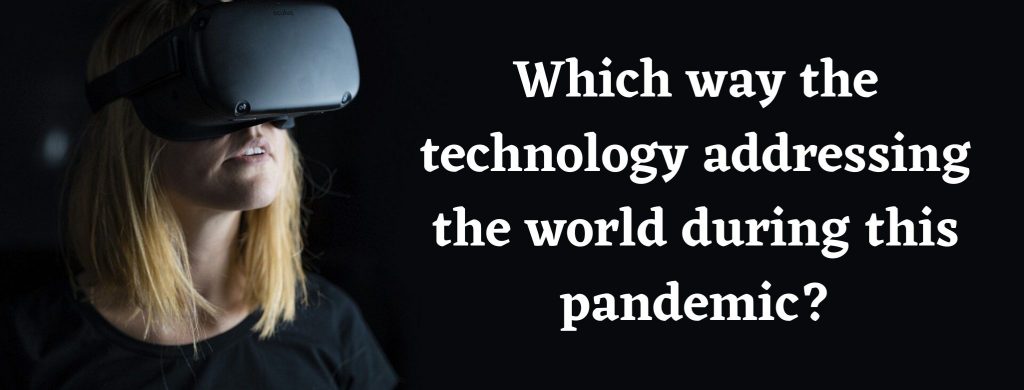Which way the technology addressing the world during this pandemic?

The world is going through a significant upheaval in the form of a global health pandemic. Most countries around the world are doing all they can to prevent the spread of the novel coronavirus. As a result, we saw a mass shut down of schools, colleges and offices. Half the world’s population are under one form of lockdown or another, confined to their houses for months. However, what this pandemic has made more evident than ever before is the value that technology adds to our lives. Throughout this global lockdown, we have witnessed the many ways in which technology has made things easier for us. So, in what ways has technology addressed the world during this pandemic? Here’s a quick look at the same.
Healthcare
The most significant help that technology has provided the world during this pandemic is in the healthcare sector. Around the world, we are seeing several research institutes and pharma companies working together to find a cure and vaccine. From Harvard to Johnson and Johnson, researchers are working against the clock to help contain this pandemic. Furthermore, corporations are also trying to figure out combination drugs that can help prevent the spread of the disease when used together.
Countries are lending each other drugs and medicines on a scale never seen before. College students, researchers and scientists are also coming out with upgrades for ventilators that help make them more efficient. Breathing apparatuses, which are vital to treating patients, also witnessed several upgrades thanks to the global scientific community. In fact, Mercedes Formula One worked with researchers to build a special apparatus that works without a ventilator and using 70% less oxygen. Certain countries are also using remote-controlled care robots to take care of their patients. These automatic medical staff can do everything from taking swab tests to checking Ultrasound scans.
Artificial Intelligence
The tracing of patients has also become an integral part of our fight against the COVID-19. In our interconnected world, AI and IoT are making it possible for healthcare workers to find links and quarantine the right people. Road maps of the places they have been to, and the people they have come in contact with help in tracing possible victims and carriers. Countries are making use of drones and other such technology to monitor people and ensure their safety. The Indian Government too came out with an app to make it easier to monitor people.
Aarogya Setu has since gone on to become one of the most downloaded and used apps in the country. Contact tracing using GPS and mobile phone tracing has helped countries all the way from China to Ghana track the disease’s spread. Liechtenstein also came out with biometric bracelets to help track potential COVID-19 cases in real-time as an early warning system. Data analytics within the bracelet help collect data on essential metrics. Such data help algorithms detect patterns in physiology to identify likely cases. Therefore, we are reaping all the benefits provided by a well-connected digital world.
Digitalisation
The COVID-19 also put in wheels the most massive exodus to remote working the world has ever seen. More people are now working from the comfort of their homes than ever before. This is primarily due to the efficient digital connections we have been able to establish. Most companies host their applications and projects on cloud servers, allowing their employees to access them from their homes. The large-scale penetration of the internet and the use of mobile devices has made this transition smooth and efficient. Furthermore, applications like Zoom and Teams have made it easier for companies to host meetings and maintain internal communication. Live presentation sharing websites allow for presentations and meetings to happen without a hiccup. Essentially, we are witnessing the dawn of a new age of employment opportunities.
Education Technology
The global pandemic also brought to a standstill our traditional forms of education. Since most schools and colleges had to shut in a bid to prevent further spread of the virus, millions of students were left without a classroom. However, digital methods of learning came to the rescue, enabling teachers and students to work together to take their learning forward. A large number of Ed-tech companies from Bjyus to Coursera opened up their services to people for free. This made it easier for children to continue their learning, uninterrupted, from the confines of their living rooms. Furthermore, server-hosted applications allowed colleges to go ahead with their evaluation so that students can move on. Several colleges around the world took online examinations to the homes of their students to make graduation a reality. In the US, we saw a host of digital graduations, where children enjoyed the rite of passage while following social distancing norms. All of these are, without a doubt, how technology has addressed this pandemic.
Logistics and Operations
Since the older generation has been confined to their homes due to being in risk of contracting the disease, we see new supply lines come up. Whether it is Reliance Mart or Swiggy, we witnessed the launch of large supply-chain logistics come to life in the last few months. From home-delivering groceries to getting cooked food to people, these companies have ensured that everyone has access to these commodities. Governments have also come out with applications to make the seamless availability of essential daily needs a reality.
This pandemic has made it very clear how globalisation and digitalisation have helped the world. Global trade and scientific relations have made it possible for even developing countries to implement new-age methods. It is globalisation that made the large-scale adoption of technology possible. This pandemic has shown us how technology will play a big part in redefining the economy of tomorrow. All key industries, such as manufacturing, food and beverages, medicine, tourism and education, will leverage technology to get itself back on its feet. Whether it is by discovering or vaccine or helping people communicate, technology has answered more questions and addressed more issues than ever before, during this pandemic.

Being a cinephile with a love for all things outdoorsy, Athulya never misses a chance to chase inspiring stories or poke fun at things, even when the subject is herself. Currently pursuing a degree in mechanical engineering, she is someone innately interested in technical and scientific research. Music reviews and op-eds define her as they allow her to explore different perspectives. Though sometimes she thinks she makes more sense playing the guitar than she does while writing.



